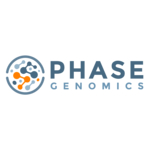Armed with the world’s largest virus-bacteria interactome repository, Phase Genomics to engineer a predictive engine for the development of new therapies against drug-resistant biothreats
SEATTLE–(BUSINESS WIRE)–#metagenomics—Phase Genomics, Inc., a leading developer of proximity ligation-based genomic solutions, today announced $5.5MM in combined non-dilutive funding from the Bill and Melinda Gates Foundation and the National Institute of Allergy and Infectious Diseases (NIAID). With the new funding, Phase Genomics will leverage its world’s largest phage-bacteria interactome repository to power the development of a unique AI-driven predictive engine for therapeutic phage discovery.
Phages are viruses that prey on bacteria and a promising tool in humanity’s battle against antibiotic resistant infections. Despite being the most abundant form of life on earth, few interactions between phages and their targets are currently documented. Phase Genomics’ proprietary technology captures virus-host interactions directly within microbial communities, without the need for culturing, allowing for rapid discovery of hundreds of new phages and their targets from even single samples.
The new financing, which includes a $3.5MM grant from the Gates Foundation and a $2MM SBIR award from NIAID, will allow Phase Genomics to harness its proximity-guided metagenomics platform, ProxiMetaTM, to develop the world’s largest atlas of phage-bacteria interactions and use machine learning tools to identify phages that can be used in therapeutic settings such as C. difficile infections, Ulcerative colitis, and Crohn’s disease. This technology will also empower improved monitoring of wastewater for resistant pathogens.
“We are truly at the frontier of a new understanding of how to improve the human condition,” said Ivan Liachko, PhD, founder and CEO of Phase Genomics. “The potential to leverage the knowledge of how viruses and bacteria interact is immense. Combined efforts with our strategic partners will help develop a global biodefense shield for pandemic prevention. We plan for the new phage atlas to serve as a resource to help combat pathogen outbreaks and other biological threats, including drug resistance caused by the overuse of antibiotics.”
Antimicrobial resistant (AMR) infection is a leading cause of intractable disease. Global health experts project that it will add $1.2 trillion to yearly global health expenditures and surpass cancer as a leading cause of death by 2050.
Broad visibility into global microbial populations enables prediction of potential sources of AMR outbreaks before they occur. It can also predict the severity of epidemics, as well as aid in the development of protective measures, like phage-based therapies. Phase Genomics will use the funding to extend its AMR atlas’ reach through international sample collection at scale to monitor the proliferation of mobile genetic elements bearing resistance traits in disparate bacterial communities.
“Phage therapeutics are a promising avenue to overcoming the looming public AMR health crisis, but our limited understanding of virus-microbe interaction and bacterial host range is a significant barrier to the advancement of this technology,” said Chris Mason, PhD, professor and renowned geneticist. “By combining machine learning tools with a vast repository of phage interactome data we’ll finally shed light on a vast scientific blind spot that will help advance global public health and help mitigate against the catastrophe of future pandemics.”
A recent study published in Nature Biotechnology demonstrates the power of Phase Genomics’ unique technology. Researchers, using Phase Genomics’ ProxiMetaTM metagenome deconvolution platform, were able to describe lineage-resolved microbial communities, aligning mobile genetic elements with host genomes and identifying hundreds of novel phage-host associations in a single microbiome sample.
Follow Phase Genomics on Twitter and LinkedIn for the latest news and information.
ABOUT PHASE GENOMICS
Phase Genomics applies proprietary proximity ligation technology to enable chromosome-scale genome assembly, metagenomic deconvolution, as well as analysis of structural genomic variation and genome architecture. In addition to a comprehensive portfolio of laboratory and computational services and products, including Hi-C kits for plants, animals, microbes, and human samples, they also offer an industry-leading genome and metagenome assembly and analysis software.
Based in Seattle, WA, the company was founded in 2015 by a team of genome scientists, software engineers, and entrepreneurs. The company’s mission is to empower scientists with genomic tools that accelerate breakthrough discoveries.
Contacts
Eric Schudiske



